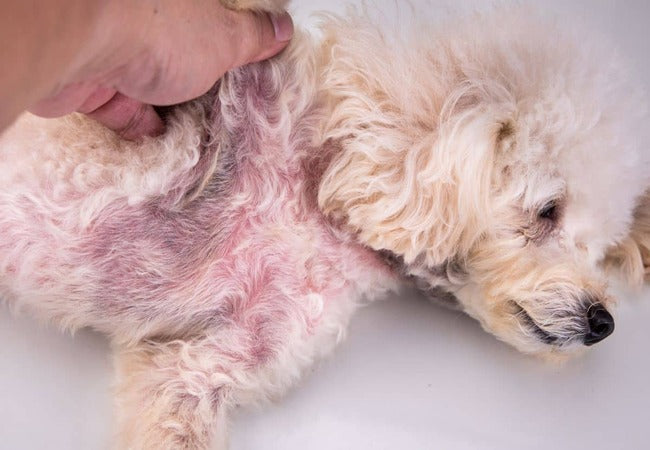Veterinary Guide to Canine Candidiasis 2025: Symptoms, Diagnosis & Prevention 🐾🩺

In this article
Veterinary Guide to Canine Candidiasis 2025: Symptoms, Diagnosis & Prevention 🐾🩺
By Dr. Duncan Houston BVSc
🔍 What Is Canine Candidiasis?
Canine candidiasis is a fungal infection caused by *Candida* species—especially Candida albicans. Unlike the more common Malassezia yeast infections, candidiasis often impacts mucous membranes (mouth, GI, urinary tract), skin folds, or ears. It takes hold when the natural microbial balance is disrupted, frequently from immune compromise, antibiotics, endocrine disease, or catheter use.
⚠️ Who's at Risk?
Although considered uncommon in dogs, candidiasis is more frequent when underlying issues are present:
- Immunosuppression (e.g. corticosteroids, cancer, stress)
- Antibiotic or steroid therapy
- Endocrine conditions: diabetes, Cushing’s disease
- Wound or catheter use, mucosal damage
- Young, old, or hospitalized dogs
🐶 Signs & Symptoms by Location
1. Oral (Thrush)
- White, cheesy deposits on tongue, palate, esophagus
- Drooling, bad breath, trouble eating
2. Skin & Skin-Folds
- Redness, greasy or crusty skin
- Itching, foul musty smell, hair loss
- Lesions in moist zones (groin, armpit, inguinal)
3. Ear Infections
- Head shaking, scratching, dark discharge, odor
- Xerosis or crusting around ear folds
4. Gastrointestinal & Urinary Tract
- Diarrhea, vomiting, weight loss, lethargy
- Painful or frequent urination; urine cultures may reveal yeast
🧪 Diagnosing Candidiasis
- Clinical signs + supportive history (antibiotics, immuno‑desease)
- Cytology: imprint, swab, or scraping to visualize yeast
- Culture & sensitivity from skin, ear, urine or mucosal swabs
- Biopsy in chronic or deep infections for histopathology
- Blood/urine tests to identify systemic involvement or comorbidities
💊 Treatment Options
Topical Therapy
- Skin folds: clean with anti-yeast shampoos, wipes several times weekly
- Ears: medicated ear cleaners + antifungal drops, often combined with steroids
- Oral: chlorhexidine, miconazole gels for thrush
Systemic Therapy
- Oral antifungals (fluconazole, itraconazole) for widespread or deep infections; duration often 4–6 weeks
- Manage underlying issues – adjust/freeze corticosteroids, regulate diabetes or Cushing’s
- Catheter removal and wound care, maintaining mucosal integrity
Anti-Inflammatory Support
Steroids or immune modulators (e.g., cyclosporine, Apoquel) may be needed briefly to ease inflammation during antifungal treatment
🏠 Home Care & Prevention
- Regular cleaning/drying of skin folds, ears, moist areas
- Use lukewarm baths with diluted vinegar rinses or medicated shampoos
- Dry areas after bathing or swimming
- Improve diet: low-allergen formulas, limit sugar/carbs, add probiotics
- Boost immune health: maintain ideal weight, exercise, treat comorbidities
- Recheck cultures 2 weeks after stopping treatment to confirm cure
📈 Prognosis
- Favorable when infection is localized and underlying issues are corrected
- Oral, skin, ear cases often resolve in 4–6 weeks
- Severe cases with organ involvement require months and vigilant monitoring
- Recurrences are common if predisposing conditions remain unmanaged
🆕 What’s New in 2025
- Rapid fungal PCR diagnostics for quick identification and drug sensitivity
- Topical probiotics to rebalance skin microbiome post-treatment
- Targeted therapies focusing on candida biofilm disruption
- Remote monitoring via Ask A Vet for chronic or recurrent cases
🔧 Role of Ask A Vet
- Ask A Vet: 24/7 access for symptom evaluation, guidance on cleaning routines, antifungal dosing, and flare-up prevention plans
👨⚕️ Final Thoughts from Dr Duncan
Candidiasis may be rare in dogs, but it can significantly impact comfort and health—especially when combined with other illnesses. In 2025, rapid diagnostics, effective antifungal protocols, immune support strategies, and telehealth mean pet owners and veterinarians can achieve better outcomes faster. Keep an eye out for persistent redness, odor, or swallowing trouble—and act early. A healthy microbiome and vigilant care make all the difference. 💙
Visit AskAVet.com or download the Ask A Vet app for expert, round‑the‑clock support on fungal infections, immune health, and home-care planning.






